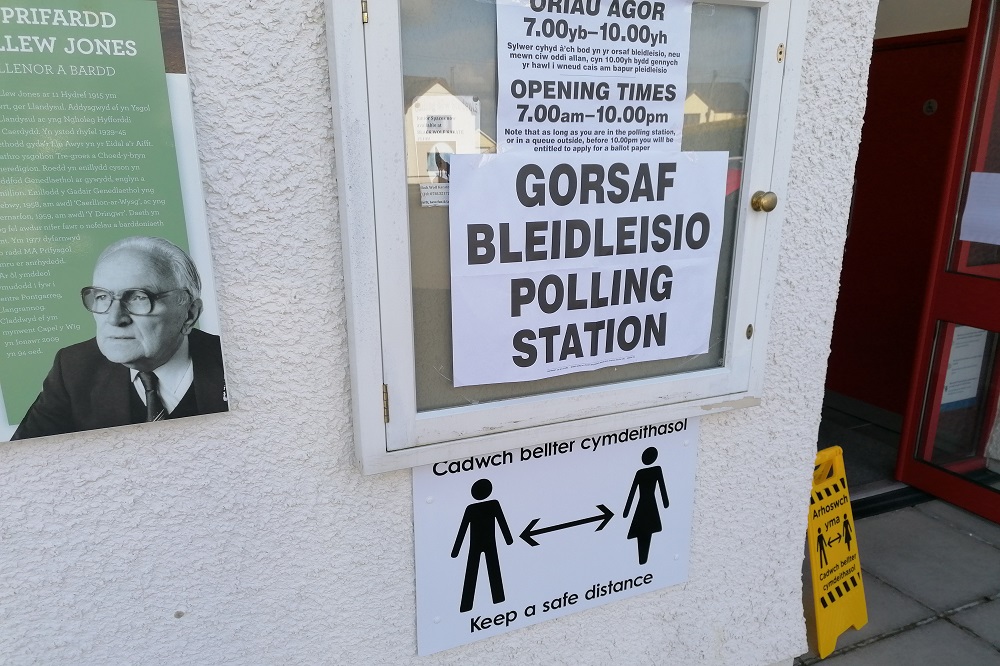RNIB Cymru warns the right to a ‘secret and independent’ vote for blind and partially sighted people is under threat

Proposed changes to UK voting legislation will affect the rights of blind and partially sighted people to vote independently and in secret according to the Royal National Institute for the Blind Cymru
RNIB Cymru says that if Westminster’s new Elections Bill is passed, it could deny them this basic right at every UK General Election.
Ansley Workman, Director for RNIB Cymru said: “Under current law, every polling station must have a device to make voting possible ‘without any assistance’ for voters with sight loss.
“The UK Elections Bill is scrapping this guarantee, making getting hold of the right equipment to vote independently a postcode lottery for blind and partially sighted people across the UK.
“Removing these protections undoes a generation’s worth of progress in accessible voting for blind and partially sighted people and goes against all aspirations around levelling up for disabled people in society.”
It is nearly 150 years since the Ballot Act guaranteed everyone the right to vote in secret.
Despite this, a survey conducted by the RNIB during the UK elections in May 2021, found that 80% of the 350,000 blind and partially sighted people in the UK felt they were unable to vote both independently and in secret, and must share their vote with a companion or presiding officer in the polling station.
Legal requirement
Currently, a tactile voting device is used to make ballot papers accessible for blind and partially sighted voters, by helping voters to find the boxes on the ballot paper independently.
It is a plastic template which fits over the ballot paper, indicating where to mark a vote next to a candidate’s name. However, it does not include the names of the candidates, meaning it doesn’t provide a fully independent vote.
While on its own is not enough for blind and partially sighted voters to review and mark the ballot paper independently, it is a legal requirement that this device should be available in all polling stations.
The RNIB UK says it is extremely concerned that wording in the Bill will reduce the legal protections for blind and partially sighted people.
On its website, it says that under section 3A of the Representation of the People Act 1983, blind and partially sighted people can currently expect certain provisions in each polling station:
(a) at least one large version of the ballot paper which shall be displayed inside the polling station for the assistance of voters who are partially-sighted; and
(b) a device of such description as may be prescribed for enabling voters who are blind or partially-sighted to vote without any need for assistance from the presiding officer or any companion.”
The Elections Bill seeks to replace section (b) above, which refers to the tactile voting device (or another device decided on by the Government), with:
(b) such equipment as it is reasonable to provide for the purposes of enabling, or making it easier for, relevant persons to vote in the manner directed by rule 37.
Postcode lottery
The RNIB says that this weakens the guarantees for blind and partially sighted people by allowing individual returning officers, rather than Government, to decide on “reasonable” provision
It fears this could create a “postcode lottery”, and cause uncertainty and anxiety amongst blind and partially sighted voters as they won’t know what they are entitled to or what to expect at polling stations.
In addition, the Bill removes the existing words “without any assistance” undermining the fact that blind and partially sighted people have a right to a secret and independent vote.
The RNIB says it has been working with the Cabinet Office for two years to develop a new way to vote independently
The proposed solution was to provide an audio player alongside the tactile voting device, to read out the names on the ballot paper, meaning there is no need for someone else to help by reading out the candidates.
This way of voting was trialled on a small scale in polling stations in Norfolk in the May 2021 elections and showed a 91 per cent satisfaction rate among users, compared with 39 per cent among blind and partially sighted voters across the rest of the country with access to the tactile voting device alone.
To try and protect the voting right of blind and partially sighted voters across the UK, the RNIB has drafted a proposed amendment to the bill and have set up a campaign to have it debated and voted on in the House of Lords.
You can support the campaign by following this link
Support our Nation today
For the price of a cup of coffee a month you can help us create an independent, not-for-profit, national news service for the people of Wales, by the people of Wales.






The senior officer at any polling station has in law the right to assist on request a person who .asks for help at the polling station to make an legally acceptable vote
They also have the right in law to prevent any one acting as a assistant if they feel that an unlawful act is taking or likely to take place and could withhold the the ballot paper from being include in the ballot subject to further enquiries being made